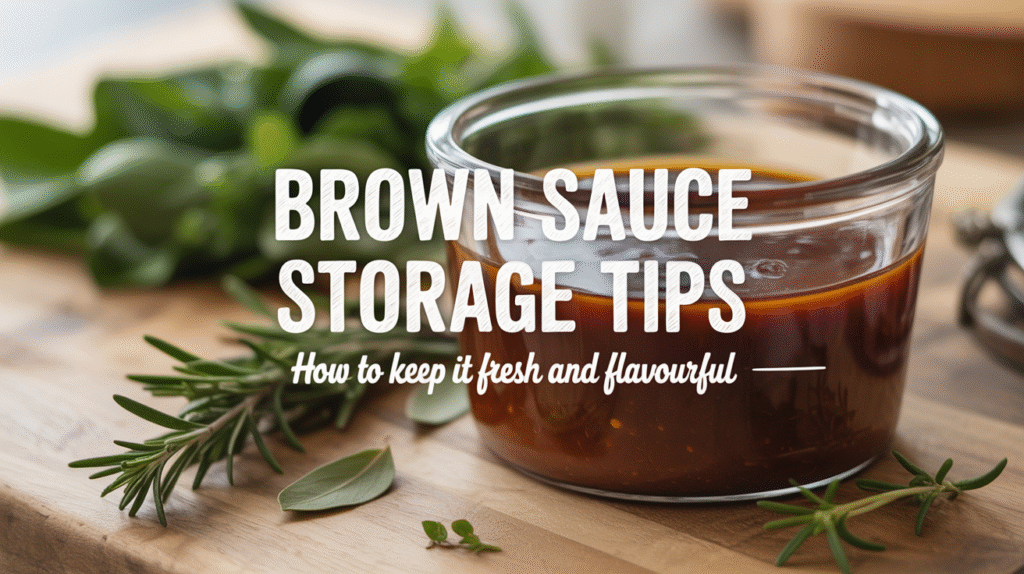Affiliate Disclosure: PantryBrands.co.uk is a participant in the Amazon.co.uk Associates Programme. As an Amazon Associate, we earn from qualifying purchases made through links on this site.
Brown sauce should be stored in a cool, dry place before opening and in the fridge once opened to maintain its flavour, texture, and shelf life. While its vinegar and salt content make it naturally preservative, poor storage can still affect its quality over time.

In this article, you’ll learn the best ways to store brown sauce, how long it lasts once opened, and what signs indicate it’s time to replace it.
Where to Store Brown Sauce Before and After Opening
Proper storage depends on whether the bottle has been opened or is still sealed.
Before Opening
Unopened brown sauce can be stored at room temperature.
- Store in a cool, dark cupboard or pantry
- Avoid direct sunlight and heat sources like ovens or stovetops
Brown sauce typically has a long shelf life (up to 12–24 months unopened) due to its acidity and sugar content, which naturally inhibit spoilage.
After Opening
Once opened, brown sauce should be refrigerated to maintain quality.
- Keep the lid tightly closed to prevent air exposure
- Store in the main body of the fridge, not the door (which is prone to temperature fluctuations)
Refrigeration slows down oxidation and prevents mould or separation, especially in sauces without artificial preservatives.
How Long Does Brown Sauce Last?
The lifespan of brown sauce depends on how it’s made and stored.
Shelf Life Guidelines
Use these general guidelines for opened brown sauce:
- With preservatives (e.g. HP Sauce): 6–9 months in the fridge
- Artisan or preservative-free versions: 4–6 weeks refrigerated
Always check the label for the manufacturer’s recommendations.
Does the Best Before Date Matter?
Brown sauce often remains safe to eat for a short period after its best before date, provided it’s stored correctly.
- Check for changes in smell, taste, or colour before using past the best before date
- If in doubt, throw it out
Best before dates refer to quality, not safety — but don’t ignore signs of spoilage.
Signs That Brown Sauce Has Gone Bad
Spoiled brown sauce will show noticeable changes in appearance, smell, or texture.
Key Indicators of Spoilage
Look for these signs:
- Mould or white fuzz around the cap or inside the bottle
- Unusual smell – sour, yeasty, or fermented notes
- Separation – water pooling on top or drastic texture changes
- Discoloured or dull appearance
If any of these are present, discard the sauce immediately.
Storing Brown Sauce in Different Containers
While most sauces come in bottles, how you store them post-opening can impact freshness.
Original Bottle vs Decanted Containers
Consider the following options:
- Original bottles are designed for prolonged storage and reduce exposure to air
- Glass containers are better for homemade sauces and should be airtight
- Plastic squeeze bottles may degrade over time, so check for wear
Always use clean utensils when transferring sauce to avoid contamination.
Cleaning the Bottle Cap and Neck
Build-up around the cap can lead to spoilage if not cleaned regularly.
- Wipe the neck and cap after each use with a clean paper towel
- Avoid dipping food or fingers into the bottle
These habits can prevent mould growth and prolong the life of your sauce.
Storage Tips for Homemade Brown Sauce
Homemade brown sauces are more delicate and have shorter lifespans than commercial ones.
Best Practices for Home-Made Varieties
Here’s how to store them properly:
- Use sterilised glass jars or bottles
- Refrigerate immediately after cooling
- Consume within 4–6 weeks
- Label the container with the preparation date
For longer storage, freeze in small batches using ice cube trays or airtight freezer-safe containers.
Can You Freeze Brown Sauce?
Freezing brown sauce is possible but not always necessary.
When and How to Freeze
Freezing is ideal for homemade sauces or bulk storage:
- Divide into small portions to avoid waste
- Use freezer-safe containers or ziplock bags
- Thaw in the fridge before use
Note that freezing may alter the texture slightly, but the flavour generally remains intact.
Brown Sauce Storage Mistakes to Avoid
Avoid these common errors to ensure your sauce stays safe and tasty.
Common Storage Errors
Many people accidentally shorten the shelf life of brown sauce by:
- Leaving the lid loose or unsealed
- Storing in hot, humid areas (especially near the cooker)
- Using dirty utensils or double-dipping
- Not refrigerating after opening
Following simple precautions can save you from tossing out a half-full bottle.
FAQs About Brown Sauce Storage Tips
Here are some questions and answers about Brown Sauce Storage Tips to help you preserve freshness and avoid waste.
Does brown sauce need to be refrigerated after opening?
Yes, it should be refrigerated after opening to maintain flavour, prevent spoilage, and extend its shelf life.
How long can I keep opened brown sauce in the fridge?
Most commercially produced brown sauces last 6 to 9 months in the fridge once opened. Homemade or preservative-free versions last about 4 to 6 weeks.
What happens if I leave brown sauce out overnight?
If left out overnight once opened, it may still be safe, but repeated exposure to warm temperatures can degrade quality. Refrigerate it as soon as possible.
Can I use brown sauce after the best before date?
You can, as long as it smells, looks, and tastes normal. However, if you notice any mould, off-odours, or separation, it’s best to discard it.
Can I freeze brown sauce?
Yes, especially homemade brown sauce. Freeze in small portions, then defrost in the fridge before use. Be aware the texture might change slightly.
